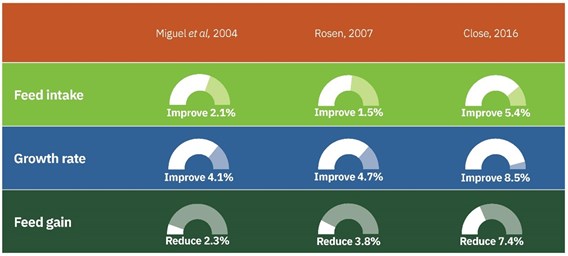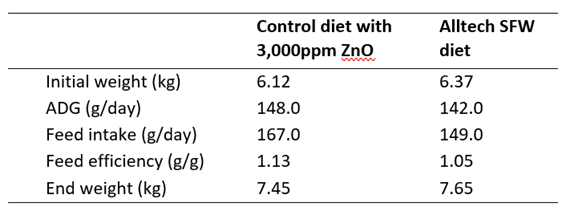19 September 2022 – With the EU’s ban on the therapeutic use of zinc oxide taking effect this year, many around the world are keeping a close eye on the bloc to see how this will affect pig production. Of equal interest to them will be how alternative strategies perform in the absence of zinc oxide and whether these can maintain producer productivity and profitability.
Alltech is confident in the viability of these strategies and, with the industry yet to find a single dietary alternative to replace zinc oxide (ZnO), is advocating for a holistic approach that encompasses nutrition and various health, welfare and management practices to help support producers post ZnO. This idea is at the core of the feed additive maker’s “Seed, Feed, Weed” (SFW) programme that focuses on supporting the developing gut of piglets. This is a key function of ZnO, which helps to control post-weaning diarrhoea and improve overall gut performance. The programme aims to do this by promoting favourable bacteria communities that can help build natural defences and maximise growth from birth.
To take us through the key features of SFW, Feedinfo recently sat down with Dr. Jules Taylor-Pickard, Alltech’s Global Director for Gut Health Management. In this Industry Perspectives she shares with us the science supporting the programme, its efficacy as a ZnO alternative strategy, and how Alltech is supporting pig producers with the correct implementation of the programme on their farms.
[Feedinfo] In June this year the EU ban on the therapeutic use of ZnO in pre-weaning piglet diets came into effect. What are the global implications of this ban?
|
|
[Jules Taylor-Pickard] It is very clear that other markets are watching Europe to see what happens. Take Canada, for example, which is typically including ZnO at between 2,500 to 5,000 ppm. But the country is reviewing to impose similar restrictions to those of the EU, with levels probably dropping to around 300-500ppm (although the exact level isn’t yet clear). China reduced their levels in 2018, going from 2,200 ppm to 1,600. So, not quite at the levels that we were at in Europe before the ban (which was around 2500ppm); but still quite high. But the general consensus is that they will reduce them even more. The United States and some countries in Asia have not reduced their levels yet, but it's definitely a case of “when”, rather than “if”. |
This is a very similar scenario to the antibiotic growth promoter ban, which started in Europe and then spread out globally over time.
[Feedinfo] Looking at the strategies that pig producers have adopted to reduce reliance on ZnO, how successful do you think they have been? Where are you seeing room for improvement?
[Jules Taylor-Pickard] There are a proportion of pig units that transitioned to ZnO-free feeding prior to the EU ban in June of this year. Common strategies used in the first 5-10 days post-weaning include feeding lower crude protein diets, use of more inert fibre sources in the diet, higher inclusion of functional amino acids, and increased use of organic acids. However, for the most part, pig producers across Europe are still actively seeking cost-effective and reliable solutions to reduce their reliance on ZnO. Because ZnO can’t be replaced by a single dietary alternative, we believe that the key to success lies in pig producers adopting a holistic strategy that encompasses not only optimal nutrition, but also management, health, and welfare practices. By focusing on a complete strategy, pig producers should be able to achieve optimal pig performance and profitability in the absence of pharmacological levels of ZnO.
[Feedinfo] And so this is what Alltech’s “Seed, Feed, Weed” piglet programme can provide farmers, right? So, what exactly does the programme entail and how it can help in the post-ZnO era?
[Jules Taylor-Pickard] We believe that the journey towards zero ZnO begins in the gut! Over the last 40 years, Alltech has conducted extensive research studying gut health and has designed several gut health management programmes that focus on supporting animal performance from birth by promoting favourable bacteria communities, building natural defences, and maximising growth. The SFW concept is one such programme that is proven to maintain a healthy gut and give piglets the best start in life in the post-ZnO era.
Establishing and maintaining a beneficial and diverse gut microbiome in early life is vital in pigs. This is because the first microbes to colonise the gut are central to the establishment of mature microbial communities, which affect the growth performance and health of pigs later in life.
The SFW programme supports gut health in piglets in three different ways:
1. “Seed” the piglet’s gut with favourable organisms to ensure a diverse microflora population can develop, creating the framework on which to build good gut health
2. “Feed” the favourable bacteria to help them outcompete gut pathogens and reduce protein accumulation in the lower intestine
3. “Weed” out the unfavourable bacteria to maintain the correct microbial balance. This is also crucial to reducing antibiotic usage and the negative effect it has on microbial diversity
By supporting gut health, through natural nutritional solutions, the digestive, absorptive, and secretory ability of the gut will increase, and this can help to mitigate the negative impacts of weaning on pig health, growth and profitability. As such, the use of novel gut health management programmes such as SFW will play a pivotal role in helping producers work towards ZnO-free production.
[Feedinfo] Sows form a key part of the programme. What evidence can you share with us on the impact maternal gut health can have on gut integrity of piglets and their performance? How can the programme be of help in this area?
[Jules Taylor-Pickard] The sow can often be overlooked when seeking alternatives to ZnO for piglets. However, to successfully transition away from ZnO, producers need to promote optimal maternal gut health which can then support the gut health of the piglet.
Maternal gut health is intrinsically linked to that of their offspring. For instance, establishing and maintaining a healthy gut in sows via the incorporation of prebiotics such as Alltech’s Actigen (derived from the yeast Saccharomyces cerevisiae) into the diet of gestating and lactating sows results in the maternal transfer of beneficial microbes at birth, increased passive immunity due to increased immunoglobulin levels, and increased milk production due to enhanced nutrient absorption. All of this supports the gastrointestinal integrity and immunity of the suckling piglets.
By focussing on the gut health of the sow, producers will subsequently see an improvement in piglet birth weight, pre-weaning mortality and weaning weights. Likewise, piglets will benefit by having a favourable gut microbial population established at birth and pre-weaning.
[Feedinfo] Following on from this, what other areas does the programme focus on to establish robust intestinal health in piglets?
[Jules Taylor-Pickard] Firstly, as described above, we need to clean up the sow to get the piglet off to the best possible start at birth. When I say ‘clean up’ the sow I mean reducing the pathogen load in the sow to lessen pathogen transfer to the piglets at birth. The piglets then move onto the SFW programme, which, as already mentioned, is designed to support piglet performance by ensuring optimal gut health and development, together with stronger immunity and better nutrient absorption as soon as possible after birth. It utilises a range of Alltech technologies and solutions, which have been shown to significantly improve the intestinal structure of piglets post-weaning when supplemented in creep and starter diets. As a result, nutrient absorption and utilisation increase, and this is subsequently followed by an improvement in piglet weight gain (Table 1). We also see a significant improvement in feed efficiency and enhanced immune status of piglets.
|
|
|
Table 1: SFW programme helps to improve piglet performance |
Also, in commercial conditions, implementing the SFW programme has produced several benefits, including an improvement in feed efficiency (see Table 2) and a reduction in mortality, while also reducing diarrhoea incidence.
|
|
|
Table 2. Feeding piglets the Alltech Seed, Feed, Weed (SFW) programme |
[Feedinfo] Of course, supressing unfavourable bacteria in the gut was a key function of ZnO in piglet diets. What are the solutions you are suggesting as part of SFW that can help here and what can you share on their efficacy to do this?
[Jules Taylor-Pickard] The “Weed” part of SFW is designed to weed out the unfavourable bacteria to maintain the correct microbial balance in the gut. This is also crucial to reducing antibiotic usage and the negative effect antibiotics has on microbial diversity. Alltech solutions included within the SFW programme help prevent pathogenic bacteria from binding to the gut epithelium. Results from recent internal research showed that the SFW programme reduced the attachment and adhesion of important pathogens, such as E. coli and Salmonella, to the intestinal cells of pigs, reducing their ability to colonise and cause disease. These pathogens can also damage the intestinal villi resulting in reduced nutrient absorption. Furthermore, the reduction of E. coli and Salmonella attachment to the gut lining can have an immediate effect on reducing inflammatory markers for infection which also means that nutrients and energy can be directed towards growth rather than eliciting an immune response. We also have recent data showing that we can reduce the prevalence of antibiotic resistance with our approach.
[Feedinfo] How well has the SFW programme been received? What are customers who have implemented the programme feeding back to you about its success?
[Jules Taylor-Pickard] According to the swine producers that we’ve spoken to the SFW programme is effective and reliable. More importantly, our local technical teams supported them all the way through to implement the holistic approach towards ZnO-free piglet production.
In fact, according to Ramon Armadans, a pig producer from Spain and one of our clients who successfully transitioned to ZnO-free piglets with the help of SFW, once the programme was implemented, he saw immediate results in his piglets. “Not only did we not experience any increase in diarrhoea incidence, but we observed that the piglets began eating solid feed earlier than with the zinc oxide-added feed, increased growth rate, with 1kg extra growth achieved at day 64 of age, and less ‘fall back’ pigs removed from pens”, he told us. “Also, our mortality rate has decreased by approximately 1% since we began using the SFW programme”.
[Feedinfo] Of course, no two farms are alike. What has Alltech put in place to ensure the adaptability of the SFW programme to pig farms in different regions?
[Jules Taylor-Pickard] We understand that no two farms are the same and therefore we tailor our programme so that it is unique to each farm. We also work closely with the pig producer, their veterinarian, and their nutritionist at every step of the way to ensure successful implementation of the SFW programme. This can be an in-depth process, because we believe in a gradual transition toward ZnO-free piglet production. We also have a team of trained technicians who employ technical farming analytics to maximize farm profitability and sustainability, like the Alltech Pig ASSIST audit and the Alltech Antimicrobial Reduction Audits. Our main aim is to provide a holistic programme that encompasses service and support within the SFW programme to effectively move pig producers to ZnO-free pig production.
Published in association with Alltech

 Dr. Jules Taylor-Pickard
Dr. Jules Taylor-Pickard
